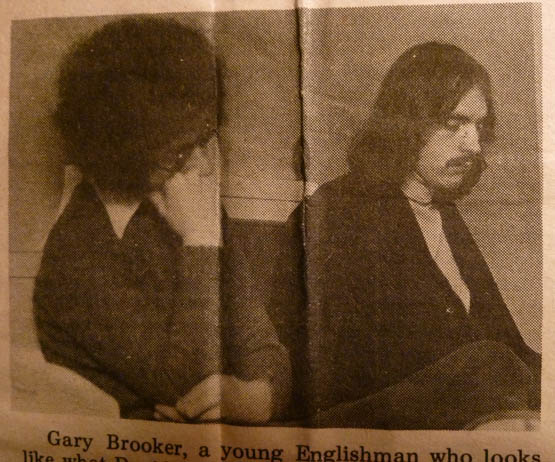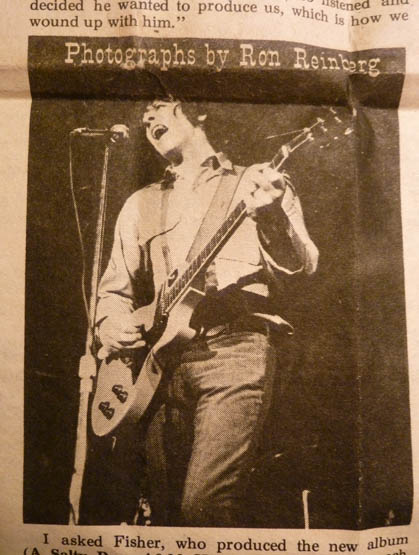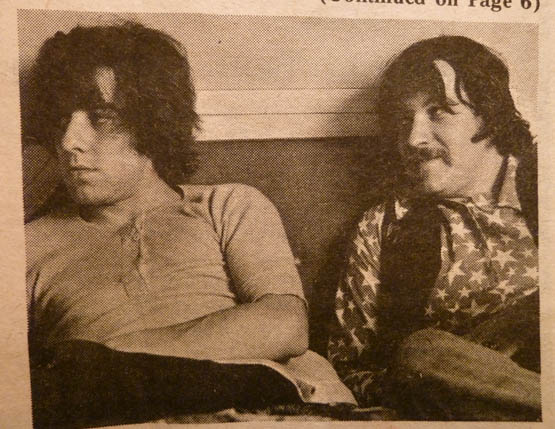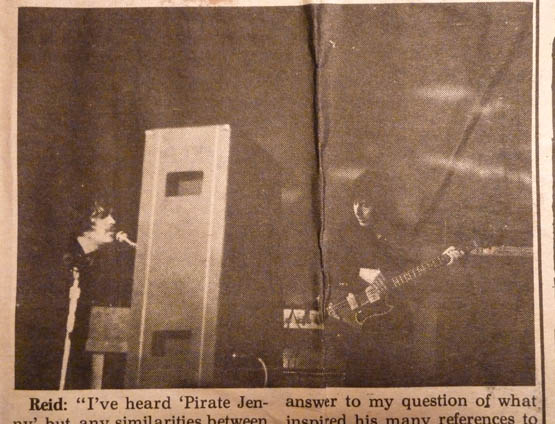Procol Harum: Shining on
Brightly
John Mendelson in Crawdaddy!,
1969
Judging from Franky Brooker's scrapbook, lately (2011) lent to 'Beyond the
Pale', this excellent interview was published in UCLA's Daily Bruin,
23 April 1969, under the title 'Will Excess Spoil Procol Harum?'. It was
illustrated with five photographs by Ron Reinberg, which we have now added to
the page. Perhaps someone can write in and explain how the article came to
appear in Crawdaddy! later on?
Gary Brooker, a young Englishman who looks like what David
Hemmings would look like if David Hemmings were stocky, brunette
and had a moustache, was sprawled on a dishevelled bed in room
1122 of a garishly posh hotel on Sunset Strip that used to belong
to Gene Autry. 'Why is it,' he asked, 'that when Ten Years After
plays New York, people as far away as the West Coast go wild,
while when we play New York it doesn't go any farther than New
Jersey?'
Mused Robin Trower, a blond, blunt-featured Cockney, from the
other bed: 'We never seem to follow our reputation. Every place
we play we go down well, and yet there's never any furore about
us like there is with other English groups.'
 BJ Wilson, who'd spent the previous forty moments alternately
grinning broadly and pulling the tobacco out of the ends of Camel
cigarettes, noted, 'Like, in every paper I see there's a huge
article on Led Zeppelin. They already have this gigantic
underground following. And we've had three albums and nobody even
notices us.'
BJ Wilson, who'd spent the previous forty moments alternately
grinning broadly and pulling the tobacco out of the ends of Camel
cigarettes, noted, 'Like, in every paper I see there's a huge
article on Led Zeppelin. They already have this gigantic
underground following. And we've had three albums and nobody even
notices us.'
Matthew Fisher sat boredly cleaning his fingernails and David
Knights looked, as usual, as if he were on the verge of speaking
(which he never, ever, does), while Keith Reid concluded, 'It's
as if we don't exist, as if we're a figment of everybody's
imagination. It seems that we constantly have to prove that we're
a group, that we're together, that we play live. People don't
seem to think of us as a working rock & roll band.'
'I hope,' I told Procol Harum, 'that this interview helps to
change all that.'
I suppose I'm expected to preface the selections from our
conversation – nothing to do with their music – and
give you only a so-rough-as-to-be-misleading idea of them as
people. Perhaps it will be enough to say that Procol Harum began
when Brooker wrote music for a packet of Reid poems and then
recorded some impressive demos of the resulting songs with
friends and fellow members of Sandie Shaw's backing group, the
Paramounts [sic], that one of these
songs, A Whiter Shade of Pale, went on to sell an
incredible number of records worldwide and make the thrown-together-and-subsequently
reassembled group a major sensation in the happy, exciting rock
and roll days of mid-1967, and that since then they have released
three albums and at least four singles that have, despite their
general excellence, been ignored by horrifyingly large numbers of
people.
There were a couple of reasons why I was a bit hesitant about
interviewing Procol Harum. In the first place, they had,
apparently through months of devoted practice, compiled a
reputation as surly, brutish, hostile, contemptuous and boorishly
self-conscious artists. Secondly, I doubted my ability to ask a
number of important questions – questions intended to be
answered in such a way that the truth or falsity of the
attributions to them of false spirituality, and of gratuitously
using little snatches of the classics and Dylan for want of their
own ideas, pretentiousness, and an inflated sense of their own
importance various critics, ghouls, and other meanies had been
known to make – without sounding accusatory, and thus
offensive.
My apprehension of the first count was only partially
justified – Brooker, BJ, and Reid (who rumour held to be the
most incorrigible ogre alive, let alone in the group) were candid
and co-operative, if not overly-enthusiastic. Knights proved an
excellent listener. Only Fisher and Trower seemed to insist that,
my long hair and buckskin notwithstanding, I was of-the-press and
therefore worthy only of mild, subvert contempt.
 As for the second count, the group seemed too secure to find
my questions accusatory, I think, and you will hopefully see that
they acquitted themselves convincingly.
As for the second count, the group seemed too secure to find
my questions accusatory, I think, and you will hopefully see that
they acquitted themselves convincingly.
Brooker's singing is utterly incredible. He is the only white
rock singer in memory who shares Stevie Winwood's facility for
sounding quite naturally black without the slightest noticeable
strain. And, like Winwood's, his voice knows no upper bounds, is
capable of reaching a full searing octave above the last note
you'd expect it to be able to hit comfortably.
[Is this why there's a picture of Steve Winwood in the UCLA Bruin article?]
All of which gave me a nice safe place to start – I asked
him about the evolution of and inspiration for his singing, to
which he replied in an accent you'd never in a million years
think the natural one of the voice on Procol Harum records,
'Nowadays I think that I've begun to sing the same way that I
talk, except without the mid-Atlantic accent. I've never tried to
put a false tone to my singing. It's just that up until recently
all the best singers I heard happened to be Negroes – Benny
[sic] King and the Coasters and so
on. What I sing like now has evolved over a period of years
during which I tried to sound like several people, to copy them.
I've always been a great Ray Charles fan, and I guess it could be
said that he's been my major influence.' We next discussed their
first two albums, Procol Harum (Deram DES 18008) and Shine
On Brightly (A&M SP 4151), their dissatisfaction with
which they've seldom gone out of their way to conceal, especially
since becoming self-produced. Brooker thinks that their previous
producer brought a minimum of concern and enthusiasm into the
studio with him, and Reid explained how they had come under Denny
Cordell's wing in the first place 'It was just one of those
things that Cordell had had got us. A mistake really. We had
originally taken some demos to a publishing company, Essex Music.
The publisher liked them and played them for Cordell, who
listened and decided he wanted to produce us, which is how we
wound up with him. It was never a matter of any great admiration
on our part for the producing talents of Denny Cordell.'
I asked Fisher, who produced the third album (A Salty Dog,
A&M SP 4179) how his approach differed from Cordell's. 'It's
difficult to say really – a producer who's also part of the
group can function very differently from one who's outside the
group,. He did as much as a producer who isn't actually part of
the group could do, which was to try to give our ideas some
direction. Being a part of the group I was in a much better
position to help things frilling from within.'
 Attempting to elicit their feelings on the allegation made by
various prominent thickheads that Procol Harum is but an
imitation of The Band from Big Pink, I asked Brooker who
he thought his group moist resembled. 'We don't really classify
ourselves that way. Like I don't see us as the same thing as John
Mayall or the same thing as the Grateful Dead. I don't see us as
the same thing as anybody really.'
Attempting to elicit their feelings on the allegation made by
various prominent thickheads that Procol Harum is but an
imitation of The Band from Big Pink, I asked Brooker who
he thought his group moist resembled. 'We don't really classify
ourselves that way. Like I don't see us as the same thing as John
Mayall or the same thing as the Grateful Dead. I don't see us as
the same thing as anybody really.'
People say that we and The Band have been influenced by one
another, which isn't true. I can see though, that people might
see similarities. Like both groups have the same line-up and
there are people in both groups who have the same sort of feel
about them.' (see here!)
At the mention of the Big Pink controversy Reid entered
the discussion. 'I think all that was the result of a great
misfortune, the liner notes on the Shine on Brightly album
(written by Paul Williams, they read in part, 'Have you noticed
how much the first Procol album influenced Music from Big Pink')
which we had absolutely nothing to do with. They told us we'd
have liner notes, but we didn't even see them before the album
came out.
'I think that's the reason for the bad
review Rolling Stone gave to the album. The guy was
apparently very offended by something we'd had nothing to do with.
A lot of things happen like that. People get completely wrong
impressions of a group because of the things that have nothing to
do with the music.'
 I suspected the moment propitious for asking a question that
would hopefully reveal the truth or falseness of the Procol Harum
As Overly Self-Conscious Artists rumors. Proceeding cautiously, I
asked them if they considered their medium a serious / exalted
art form. If they're the super-defensive snobs some have accused
them of being, they do a good job of keeping it quiet in
responding to such questions.
I suspected the moment propitious for asking a question that
would hopefully reveal the truth or falseness of the Procol Harum
As Overly Self-Conscious Artists rumors. Proceeding cautiously, I
asked them if they considered their medium a serious / exalted
art form. If they're the super-defensive snobs some have accused
them of being, they do a good job of keeping it quiet in
responding to such questions.
Reid: 'We take what we do as seriously as any creator does. I
do think, though, that people do try to elevate a lot of unworthy
things to the level of Art.'
Trower: 'A lot of people are producing pop music just because
it's such easy money. It's as if pop music has taken over from
boxing.'
Brooker: 'Certainly some parts of rock and roll are artistic.
I think the writing of a song is artistic, that the improvisation
of a solo is artistic. It's when you try to make it into a record
or perform it on stage that it becomes, instead of art, more an
invention, a commercial thing.'
Reid: 'What makes it all so confusing is the public's
inability to deal with art. It becomes a question of success
really. You see so many people who are just so much rubbish
becoming as successful as somebody who's great.'
Fisher: 'The people who leave rock not because it's not
artistically satisfying, but because it's not as stable as other
forms [sic]. Like Presley, who quit
to become a film star.'
Further attesting to the ridiculousness of the allegations
that Procol Harum's scene is essentially to come on very cerebral
and spiritual was Trower's description of the Procol audience:
'They jump and bop about, they're affected physically. We hate to
see an audience just sitting there on its hands. That's why on
stage we do mostly our rockers. If the audience bops we bop. Our
stage presence is just a response to the mood of the audience.'
Reid's lyrics are as inaccessibly personal as any in
contemporary rock, which makes a lot of people furious. One
friend of mine, in fact, suspects that Reid writes 'with a
Thesaurus in one hand and a mythology reader in his lap.' I got
Reid to talk about that of which he is most frequently accused,
pretension, and his remarks should change the minds of those who
accuse him of attempting to exempt himself from such
considerations 'My greatest fear is pretension, which to me is
the worst sin of all. I'm always worried that what I write may
seem pretentious, and that's the only judgment I try to make of
myself. What I said in the opening part of In Held 'Twas In I'
(an eighteen-minute collage piece on their second album) is true
– when I say or write something pretentious I do cringe with
embarrassment.'
 I consider Reid's lyrics to be one of the most interesting
things about the music of Procol Harum, and I succeeded in
encouraging him to discuss his life and times as the group's
resident poet (his sole function, incidentally, is to write
lyrics – he does not perform with the group on stage) 'When
I just started out I would look at something I'd written and
think that it would be nice turned into a song. Lately I've
become aware of the pressures that we've got to do so many songs
a year, that so many lyrics have to bc written.
I consider Reid's lyrics to be one of the most interesting
things about the music of Procol Harum, and I succeeded in
encouraging him to discuss his life and times as the group's
resident poet (his sole function, incidentally, is to write
lyrics – he does not perform with the group on stage) 'When
I just started out I would look at something I'd written and
think that it would be nice turned into a song. Lately I've
become aware of the pressures that we've got to do so many songs
a year, that so many lyrics have to bc written.
I've usually written my lyrics when I've been unhappy or
troubled, which can be any time of the day or night. They just
start off from a single line, from three words that I've fit
together. For the first song lyric I wrote, Something
Following Me, I just had the idea of someone being followed
about by his tombstone. Nowadays I just fit some words together
and that sets my mind functioning for a whole poem in that
particular way. I don't think much about what I'm doing.
'I can't sit down and think out a whole poem before I write it.
My writing just has to flow.
'I read that Paul Simon spent six months writing and rewriting
The Sounds of Silence.' I simply couldn't do it that way.
'I'm not really annoyed when people ask me the meaning of
something I've written – it's just that they're missing the
point. It's like looking at a picture or going to the cinema. You
needn't ask what the meaning of what a piece of art is [sic] because its meaning is explicit in
whatever you intuitively feel that meaning to be.
'Only when I look back at something I've written do all its
possible meanings become evident to me.'
As was noted above, critics have often accused Procol Harum of
lifting things from the classics in an attempt to endow their own
music with a sort of spiritual pomposity. The music for A
Whiter Shade of Pale was allegedly borrowed intact from
Bach's Sleepers Awake. Parts of the arrangement of The
Wreck Of The Hesperus from Wagner's Tannhauser, and
the inspiration for the lyrics of A Salty Dog from Jenny
the Pirate, a selection in the Three-Penny Opera. I
asked each of the defendants if the similarities between the
pieces with which I associated them and their classical
counterparts was intentional and / or conscious.
Fisher: 'When I wrote The Hesperus I didn't have any
orchestration in mind. When I arranged it for the orchestra I
included the Wagnerian bit simply because it happened to come
into my mind at a time when I was looking for something that fit
in that particular place. It just sounded appropriate, so in it
went.'
Brooker: 'Pale was really more of an exception than a
rule as far as my songwriting goes. It was an attempt to have a
guy singing over a background of Bachy-sounding instrumentation.
Certainly it wasn't deliberately copied from anything. I'm not
even familiar with Sleepers Awake.'
Reid: 'I've heard Jenny the Pirate, but any
similarities between it and Salty Dog are unintentional.'

That resolved, we turned our attention to the Salty Dog album.
Fisher explained the seemingly incongruous clapping, falsetto-laden
tail or Pilgrim's Process: ''I couldn't for the life of me
think of a way to end it except for the very obvious way, which
would have been to go back to the beginning bit. That would have
been anti-climactic. Even before I finished writing the song I
had that sort of closing bit in mind for the end. It may look as
if it were stuck on as an afterthought, but it wasn't.' Of Juicy
John Pink, a very crude twelve-bar blues that I originally
thought was a parody, Trower said, 'It's us trying to get a
really dirty Muddy Waters type sound. It was recorded in a
friend's basement with two old microphones and Gary standing
about ten feet away. The name isn't any mysterious English pun
– when Keith and I had written it we thought it should be
recorded on Blue Horizon and that we'd call the artist Juicy John
Pink.' He described his awful singing on Crucifiction Lane'
.as an attempt to give the song 'a sort of Otis Redding feel.'
Reid's answer to my question of what inspired his many references
to sailors and ships and seas throughout the album was, 'I just
love nautical vocabulary, which I find so very rich.'
My supply of intelligent questions exhausted, I grabbed for an
old standby and asked the group what musical directions they
looked forward to exploring.
'I'd like to play some flower music,' replied Brooker, having
become bored.
'We're not really moving off in any different directions, but
instead attempting to get deeper into what we've been doing,'
replied Fisher, solemn and erudite to the last.
Anyway, I went and saw them. perform the evening of the day I
interviewed them and left their performance convinced that they
are really neither more nor less than an incredibly moving rock
and roll band (Brooker's singing, Trower's guitar playing, and
BJ's drumming are all indescribably good, right, but that's a
subject for another article). Don't let all the silly nonsense
you've heard about their being stuffy and pompous and pretentious
musically keep you from listening. You'll be missing an awful lot.
Read another fine feature from Crawdaddy!
More about
Procol Harum and The Band | See also
here
 BJ Wilson, who'd spent the previous forty moments alternately
grinning broadly and pulling the tobacco out of the ends of Camel
cigarettes, noted, 'Like, in every paper I see there's a huge
article on Led Zeppelin. They already have this gigantic
underground following. And we've had three albums and nobody even
notices us.'
BJ Wilson, who'd spent the previous forty moments alternately
grinning broadly and pulling the tobacco out of the ends of Camel
cigarettes, noted, 'Like, in every paper I see there's a huge
article on Led Zeppelin. They already have this gigantic
underground following. And we've had three albums and nobody even
notices us.' As for the second count, the group seemed too secure to find
my questions accusatory, I think, and you will hopefully see that
they acquitted themselves convincingly.
As for the second count, the group seemed too secure to find
my questions accusatory, I think, and you will hopefully see that
they acquitted themselves convincingly. Attempting to elicit their feelings on the allegation made by
various prominent thickheads that Procol Harum is but an
imitation of The Band from Big Pink, I asked Brooker who
he thought his group moist resembled. 'We don't really classify
ourselves that way. Like I don't see us as the same thing as John
Mayall or the same thing as the Grateful Dead. I don't see us as
the same thing as anybody really.'
Attempting to elicit their feelings on the allegation made by
various prominent thickheads that Procol Harum is but an
imitation of The Band from Big Pink, I asked Brooker who
he thought his group moist resembled. 'We don't really classify
ourselves that way. Like I don't see us as the same thing as John
Mayall or the same thing as the Grateful Dead. I don't see us as
the same thing as anybody really.' I suspected the moment propitious for asking a question that
would hopefully reveal the truth or falseness of the Procol Harum
As Overly Self-Conscious Artists rumors. Proceeding cautiously, I
asked them if they considered their medium a serious / exalted
art form. If they're the super-defensive snobs some have accused
them of being, they do a good job of keeping it quiet in
responding to such questions.
I suspected the moment propitious for asking a question that
would hopefully reveal the truth or falseness of the Procol Harum
As Overly Self-Conscious Artists rumors. Proceeding cautiously, I
asked them if they considered their medium a serious / exalted
art form. If they're the super-defensive snobs some have accused
them of being, they do a good job of keeping it quiet in
responding to such questions. I consider Reid's lyrics to be one of the most interesting
things about the music of Procol Harum, and I succeeded in
encouraging him to discuss his life and times as the group's
resident poet (his sole function, incidentally, is to write
lyrics – he does not perform with the group on stage) 'When
I just started out I would look at something I'd written and
think that it would be nice turned into a song. Lately I've
become aware of the pressures that we've got to do so many songs
a year, that so many lyrics have to bc written.
I consider Reid's lyrics to be one of the most interesting
things about the music of Procol Harum, and I succeeded in
encouraging him to discuss his life and times as the group's
resident poet (his sole function, incidentally, is to write
lyrics – he does not perform with the group on stage) 'When
I just started out I would look at something I'd written and
think that it would be nice turned into a song. Lately I've
become aware of the pressures that we've got to do so many songs
a year, that so many lyrics have to bc written. 